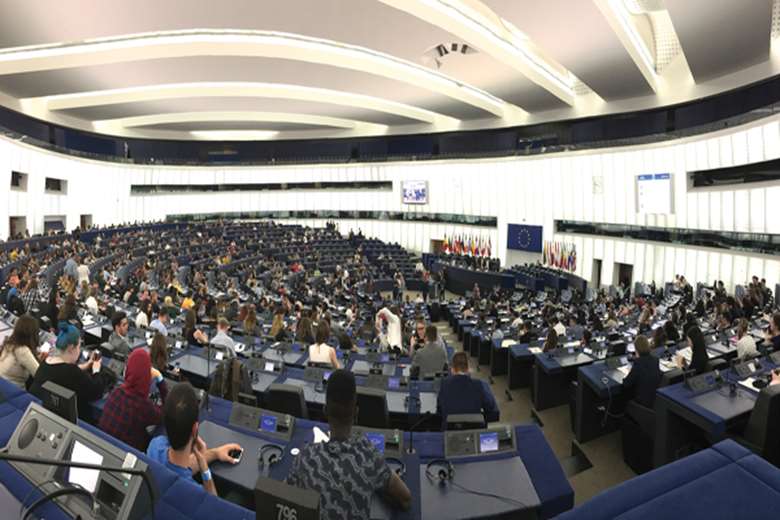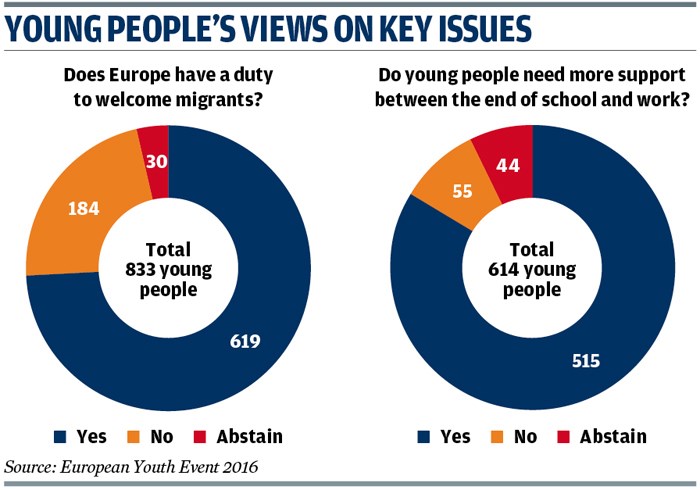Europe's young people tackle key EU issues
Adam Offord
Tuesday, June 7, 2016
Young people from across Europe came together last month to debate what the EU can do to improve opportunities and deal with social problems.

The continent of Europe and member states of the European Union (EU) have been faced with several major challenges in recent years, most notably the refugee crisis and deep cuts to public spending as a result of economic austerity.
It also faces the prospect later this month of the British public voting to leave the union when the referendum on its membership takes place on 23 June.
But young people’s views on some of these key challenges have largely gone unnoticed. In a bid to hear what young Europeans think about these and other issues, the European Parliament held a two-day event in Strasbourg, France, last month (see box).
CYP Now attended to hear what young people had to say.
Refugee crisis
Migration is an issue that has generated deep divisions between European leaders, and it appears to be the same story among young people (see graphic).
Matthäus Fandrejewski, a 26-year-old youth representative of CESI, the European Confederation of Independent Trade Unions, who migrated at the age of five from Poland to Germany, believes a “proper burden system” should be created to tackle the influx of migrants and refugees.
“A system would be put into place with a quota based on the calculation of the gross domestic product and then give refugees three to five countries to choose where they would like to go,” he says.
He explains the system would be made up of three components – languages spoken, family and qualifications.
“Having someone already from the family here would lead to an easier arrival and faster integration,” he says. “If the refugees have a profession that is needed in a country, it could be proposed to go to this country.”
Another young delegate from London proposes former colonial powers such as Britain, France and Italy pay reparations to former colonised countries to ensure there is economic stability so people do not have to move.
But not all young people are open to the idea of helping migrants and refugees, with one delegate from France arguing that unemployment levels are in their millions in countries like Greece and France without the extra influx of people.
Youth unemployment
Youth unemployment has been an issue for many EU member states, especially since the financial crisis. The event welcomed ideas on how youth unemployment can be eradicated within a decade.
Marianne Thyssen, European commissioner for employment, social affairs, skills and labour mobility, says young Europeans have been particularly affected despite being “the most highly educated generation in history”.
She says a new skills agenda for Europe aims to make better use of young people’s existing skills and equip them with those needed to find quality jobs and enhance life chances. It will focus on those who lack basic skills and stress the role of vocational training and apprenticeships in bridging the gap between education and employment.
Lidija Globokar, president and co-founder of Project668, an organisation that aims to prevent youth unemployment, believes a pilot should be set up for a careers centre for final year students.
Another young delegate argues for more careers guidance to be offered by schools, businesses and non-governmental organisations so young people know what opportunities are available early.
Erasmus+ programme
The Erasmus+ programme is the main EU fund for youth groups and services. It supports education, training, youth and sport projects including exchanges, the European Voluntary Service and networking.
Rainer Wieland, vice-president of the European Parliament, hailed the programme for doing an “amazing” job with the little money it has been granted by member states. However, he says it is now important the programme does not just focus on the everyday student but reaches other young people who are on apprenticeships.
“We should reach out for other professions and people who are in apprenticeships,” he says. “Maybe it should become more normal that schools have an exchange school so 14- and 15-year-olds can stay for a fortnight with another family.”
Jens Nymand Christensen, deputy director-general for education and culture at the European Commission, says investment in the programme should be expanded.
“Right now, one in 10 a year can go on an Erasmus+ exchange,” he says. “We aim to double that, but I agree we should be ambitious and set a much higher target.
“It doesn’t have to be for a year and surely it isn’t only academic students, but it is something that we can use to get young people to take an active role in society.”
Brexit threat
Talk and debate about whether Britain will vote to leave the EU has divided politicians and political parties alike. But it seems young people from across Europe are also split on whether Britain leaving is the correct thing to do.
Liam Beattie, a youth activist from Edinburgh and policy and political officer at HIV Scotland, says the UK and Europe will achieve more in stamping out inequality, discrimination and prejudice towards LGBT (lesbian, gay, bisexual and transgender) people, refugees and other minority groups by working together rather than in isolation.
“The UK has an opportunity to be a progressive voice alongside our neighbours in countering discrimination and leading the way,” he says.
However, Anna Sonny, a former Erasmus student and EU project manager at charity Civitas, argues that people in the UK do not feel European. “I spent half my year in Spain and I really felt European when I was there. But when I’m in the UK, I just feel British,” she says. “There is a big divide not just geographically but in terms of mentality about what European solidarity is.”
European Youth Event
- The European Youth Event (EYE) is an initiative that allows young people aged 16 to 30 from across Europe to discuss youth issues
- On 20 and 21 May, more than 7,500 young Europeans visited the European Parliament in Strasbourg, France, to exchange ideas and perspectives on the EU
- A follow-up to the initial EYE in 2014, the event aims to open dialogue between young people and give them a platform for ideas





